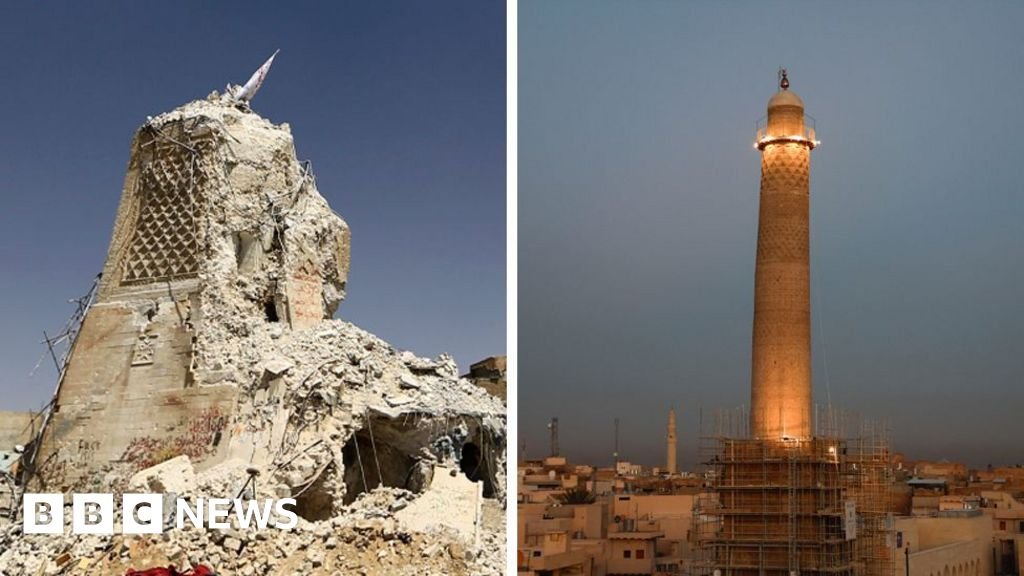Contrition to defiance ahead of second impeachment vote

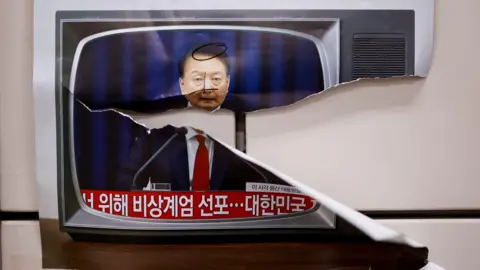 Reuters
ReutersThe news is moving so quickly in South Korea, the papers can no longer keep up. President Yoon Suk Yeol’s shock attempt to impose martial law last Tuesday night was so short-lived it failed to make the front page. By the time he despatched the troops, the press had already gone to print. By the following day’s editions, the failed power-grab had already been defeated.
Within the week, the president has morphed from being contrite and apologetic, hoping to avoid impeachment, to brazenly defiant, vowing to fight on as the net closed in on him.
Banned from leaving the country while he is investigated for treason – a crime punishable by death – he is facing a second impeachment vote this weekend, as support from his party trickles away. Meanwhile, the roars of anger from the thousands of people on the street every night are getting louder.
For a short while this week it looked as if he had struck a deal with his party to stand down early, in return for them not booting him out of office in last Saturday’s vote. But as the week sped by, there was no sign of the president nor the details of such plan, and it gradually became obvious Yoon had zero intention of resigning.
On Thursday, he emerged obstinate. “I will fight until the end,” he declared, as he defended his decision to seize control of the country.
His speech was rambling and filled with unsubstantiated conspiracy theories, including a vague suggestion that North Korea could have rigged the previous elections, in which he had failed to win control of parliament. The parliament was a “monster”, he said; the opposition party “dangerous”, and he, by declaring martial law, was trying to protect the people and save democracy.
Yoon spent much of this week in hiding, while police attempted to raid his offices to gather evidence. To try and temper public anger, his party announced that he would not be allowed to make decisions going forward – even though legal experts agreed there was nothing in the constitution that allowed for this.
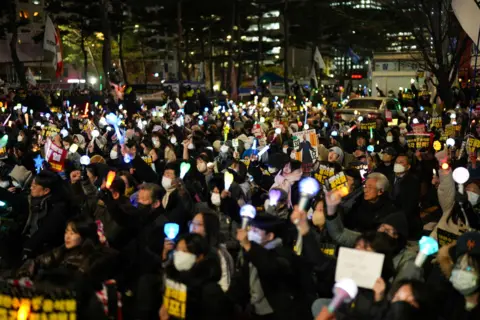
This has left everyone with the same, pressing question – who IS running the country? – especially as senior commanders of Yoon’s army have said they would defy his orders if he tried to impose martial law again.
There is now an unnerving power vacuum in a country that lives with the continuous threat of being attacked by North Korea. “There is no legal basis for this arrangement. We are in a dangerous and chaotic situation,” said Lim Ji-bong, a law professor at Sogang University.
It was evident to all those on the outside that this destabilising and bizarre situation could not be allowed to continue much longer. But it took the president’s party, the People Power Party (PPP), some time to realise Yoon’s impeachment was unavoidable.
Initially his party members protected him, eager to save their own political skins, and consumed by their hatred of South Korea’s opposition leader, Lee Jae-myung, who they fear will become president if Yoon is removed. But on Thursday, after stalling for days, the PPP leader, Han Dong-hoon, came out to urge all MPs to impeach him. “The president must be suspended from office immediately,” he said.
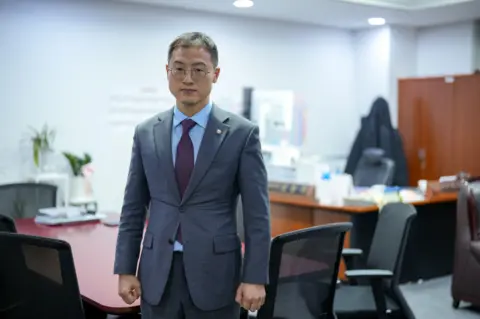
For the impeachment to pass, two-thirds of parliament must vote in favour, meaning eight ruling party MPs must join the opposition. A handful have so far declared their intention to do so. One of the first to change his mind was Kim Sang-wook. “The president is no longer qualified to lead the country, he is totally unfit,” he told the BBC from his office at the National Assembly.
But Kim said not all MPs would follow his lead; there is a core that will stay loyal to Yoon. In his very conservative constituency, Kim said he had received death threats for switching sides. “My party and supporters have called me a traitor,” he said, labelling South Korean politics as “intensely tribal”.
The vast majority of anger, however, has been directed at the MPs who have shielded Yoon up to this point.
At a protest on Wednesday night the chants had changed from merely “impeach Yoon” to “impeach Yoon, dissolve the party”.
“I hate them both so much right now, but I think I hate the MPs even more than the president,” said a 31-year-old graduate student Chang Yo-hoon, who had joined tens of thousands of others, in freezing temperatures, to voice his disillusionment.
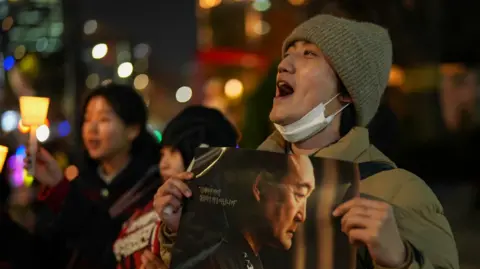
All week, lawmakers have been bombarded with thousands of abusive messages and phone calls from the public, in what one member of parliament described to me as “phone terrorism”, while some have been sent funeral flowers.
Even if enough MPs vote to impeach Yoon this weekend, his party, now divided and widely detested, faces political oblivion. “We don’t even know who we are or what we stand for anymore,” one exasperated party official told me.
The defecting lawmaker Kim Sang-wook thinks it will take time to regain voters’ trust. “We will not disappear, but we need to rebuild ourselves from scratch,” he said. “There is a saying that South Korea’s economy and culture are first class, but its politics are third class. Now is the chance to reflect on that.”
Yoon has dealt a severe blow to South Korea’s reputation as a well-established, albeit young, democracy. There was pride when MPs swiftly overturned the president’s martial law decision, that the country’s democratic institutions were functioning after all. But the fragility of the system was exposed again, as the party manoeuvred to keep him in office, with the opposition branding this a “second coup”.
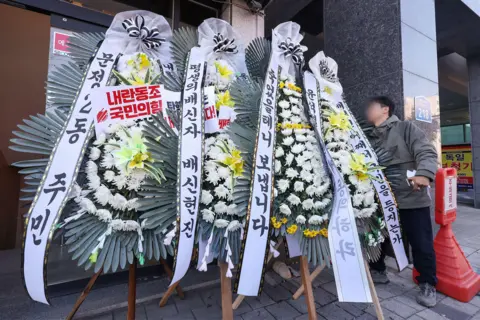 News1
News1But Professor Yun Jeong-in, a research professor at Korea University’s Legal Research Institute, insisted the country was dealing with “an aberration, not a systemic failure of democracy”, pointing to the mass protests every night. “People are not panicking; they are fighting back. They see democracy as something that is rightfully theirs,” she said.
Damage has also been done to South Korea’s international relationships, and ironically to much of what Yoon wanted to achieve. He had a vison that South Korea would become a “global pivotal state”, playing a bigger role on the world stage. He even hoped to earn Seoul an invitation to join the elite group of G7 countries.
A Western diplomat told me they were hoping for a “swift resolution” to the crisis. “We need South Korea to be a stable partner. Impeachment would be a step in the right direction.”
If Yoon is suspended from office on Saturday, he will not leave without a fight. A prosecutor by trade, who knows the law inside out, he has decided he would rather be impeached, and challenge the decision when it goes to court, than go quietly. And the shockwaves he has set off are going to ripple through the country for years, perhaps decades, to follow.
Additional reporting by Jake Kwon and Hosu Lee.
https://ichef.bbci.co.uk/news/1024/branded_news/031f/live/6f9e1180-b8bb-11ef-a2ca-e99d0c9a24e3.jpg
2024-12-12 23:16:53






